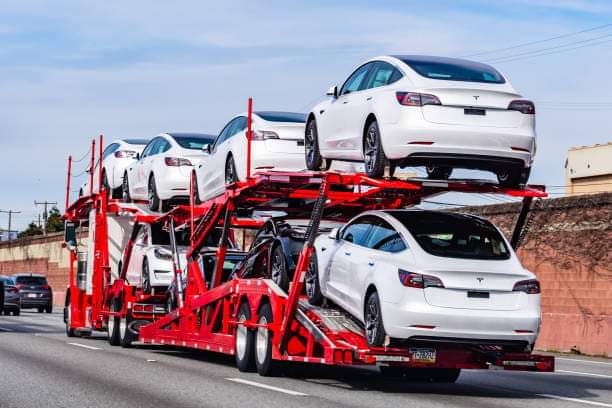Importation of second-hand vehicles into Africa continent is one of the greatest contributers to air pollution.
This is according to United Nations Environmental Assembly (UNEA-6) report dubbed Used Heavy Duty Vehicles and the Environment – A Global Overview of Used Heavy-Duty Vehicles: Flow, Scale and Regulation.
The report released on the sidelines of the Climate and Clean Air Conference held at United Nations Environmental Programme (UNEP) in Nairobi, Kenya, in February.
Low quality heavy -duty vehicles (HDV) especially trucks and buses are said to be responsible for big percentage of this menace.
According to the report, African countries import the cheapest HDVs, most of which are old.
In 2020 alone, the average price of a used HDV in Africa was close to 5,900 UD Dollars, while it was 11,200 US Dollars in Asia Pacific, and 11,100 US Dollars in Latin America and the Caribbean.
The same was 8,000 US Dollars in the Eastern Europe, Caucasus, and Central Asia and 9,700 US Dollars in the Middle East.
The countries with very poor regulation are attracting the worst quality of used trucks and buses, vehicles that may be 20 years old, that may have 500,000 or a million kilometres on their odometer
Rob de Jong, Head of UNEP’s Sustainable Mobility Unit
The report noted that most African countries do not have policies on vehicle importation, thereby many dealers purchase used vehicles for quick sale.
The report further stated that though HDV exports represent a paltry 3.6 per cent of the global automotive trade’s total value, their associated carbon dioxide emissions have risen by more than 30 per cent since 2000, with trucks accounting for 80 per cent of this increase.
Low quality imports in Africa
Additionally, HDVs participate substantially in environmental pollution, contributing to over 40 per cent of on-road nitrogen oxides (NOx) emissions, over 60 per cent of on-road particulate matter (PM 2.5), and more than 20 per cent of black carbon emissions.
This significant price difference, the report notes, is due to the HDVs exported to Africa being of lower quality, poor technology penetration and fuel efficiency or lower gross weight.
The report also found that 48 of the 54 African countries reviewed have inadequate measures to regulate used HDV imports.
Additionally, about 55 per cent of countries in Africa do not regulate used HDV imports or lack a comprehensive set of regulations for used HDV imports.
Though vehicle age restriction is the most common approach to regulate the import of used HDV, slightly 63 per cent of African countries impose this limit.

Kenya is among the countries with regulation requirements that the vehicle cannot be more than eight years old from the year of manufacture.
“The countries with very poor regulation are attracting the worst quality of used trucks and buses, vehicles that may be 20 years old, that may have 500,000 or a million kilometres on their odometer,” Rob de Jong, Head of UNEP’s Sustainable Mobility Unit, said.
Ms Jong noted that the adoption and implementation of Euro 4 Standards would reduce emissions of particulate matter and black carbon by 75 per cent in the sector.
This is because these standards are stricter and more comprehensive in limiting emissions.
Exporting countries also do not have standards to ensure that the vehicles are of good quality, thus, the report calls for shared responsibility to improve and regulate quality.
This will minimize negative impacts and ensure that used HDVs make meaningful contributions towards shifting to cleaner, safer, and affordable mobility, as well as emission reduction in the developing world.
“From the exporters’ side, the policy measures that can be adopted include banning the export of end-of-life used HDVs, making sure exported vehicles have a valid roadworthiness certificate, and helping importing countries with standards compliance checks,” the report states.
Additionally, the report recommends harmonization of regulations as it will contribute greatly to deter the import of obsolete, unsafe, dirty, and faulty used HDVs.
Africa is already leading on this front with the Economic Community of West African States (ECOWAS) and East African Community (EAC) Member States adopting Euro IV regulations for new and used HDVs.
Other suggestions include the need for incentives to leapfrog to clean technologies like electric mobility to include trucks and buses in developing countries.
From the exporters’ side, the policy measures that can be adopted include banning the export of end-of-life used HDVs, making sure exported vehicles have a valid roadworthiness certificate, and helping importing countries with standards compliance checks
UNEA Report
Better quality and more accessible data to improve future analysis, and more research to detail the impacts of used HDVs trade on the environment, economy and road safety.
The report represents the first effort of quantifying and qualifying used heavy-duty vehicle flows, based on export data from Japan, the European Union, and the Republic of Korea – altogether representing about 60 percent of the total new and used HDV export market – to 146 predominantly low- and middle- income countries.
The report has limitations, most notably discrepancies in statistics, as well as lacking publicly available data from the USA, which does not separate exports of new and used vehicles, and China, an emerging exporter.
